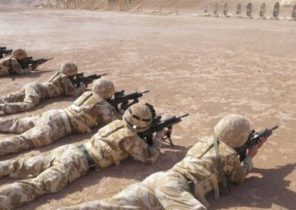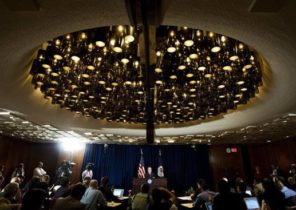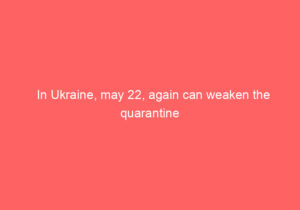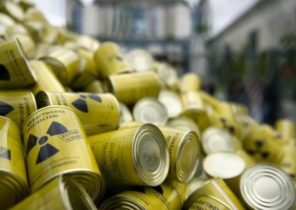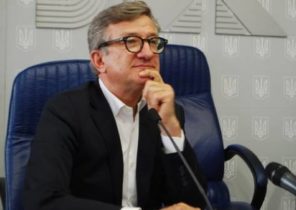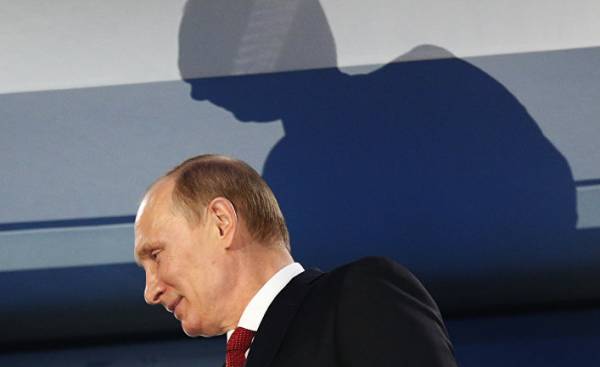
Seven months ago it seemed that the risky adventure of Vladimir Putin, election-related, bear fruit. Hillary Clinton swore will conduct a tougher policy toward Moscow than her predecessor, unexpectedly lost who breaks all the rules to Donald Trump, who during his election campaign radically deviated from the usual relationship of the two parties to Russia, stating his desire to find common ground with the Kremlin. Occasionally trump said that Russia’s takeover of Crimea will not become a stumbling block on the path to better relations, threatening in this case, the lifting of sanctions imposed during the reign of the Obama administration.
In France, among the candidates for a place in Francois Hollande at the Elysee Palace were arguing politics-the conservatives and the nationalists, promising to improve ties with Moscow. Across Europe populist parties that expressed a Pro-Russian stance in their foreign policy programmes seemed to have gained popularity, expressing doubts about whether to support the General direction of foreign policy (including the increased pressure on Russia), moderated by long-term Chancellor of Germany Angela Merkel.
But by the summer of 2017 what seemed a victory, burst like a soap bubble. Unable to refute the charges that his election to the presidency was the result of covert support from Russia, trump was also unable to change the course of American policy towards Russia. Despite his campaign rhetoric of cooperation with Moscow, in the establishment in the sphere of national security in the administration of the tramp turned out to be a policy that expresses the skeptical position in relation to Russia. This is rapidly followed by a strengthening of NATO forces and missile defense, and Congress, with distrust of both Putin and his relationship with trump, not only legally approved but also increased the anti-Russian sanctions, depriving the President the ability to cancel or change them.
Amazing victory of Emmanuel Macron in the French presidential race and his partnership with Merkel (which is the highest statesman in the North Atlantic Alliance and, most likely, will cope with the wave of populism and will retain his post and become the Western leader-the champion in terms of innings) also dispelled the hopes of Moscow at that election in 2017 will bring drastic changes in European policy toward Russia.
Moscow hopes that this time will be a change in the policy of the West towards Russia, which will find expression in the easing or even lifting of the sanctions regime. Instead, the EU extended the restrictive measures for six months, and the US expands its sanctions. Up to this point have not been any true differences that would prevent the solidarity of the West. An important criterion was the persistence of Japan in strengthening the sanctions despite the apparent desire of Prime Minister Shinzo Abe to improve relations with Russia (earlier in July has been postponed joint plans of Japan and Rosneft on the start of drilling in the Pacific ocean).
Whether Moscow is ready to change his line of conduct in the international arena, if the original expectations have not yielded any fruits? This seems unlikely. In the last three years, the Kremlin has persistently pursued its policy. In Syria, he continued to support Bashar al-Assad has strengthened his position. Russia does not intend to abandon the Crimea and will not leave their intermediaries separatists in the Donbas. Moscow also does not want to give up their tools of influence, to acknowledge any participation and repent for what happened in the election campaigns in the West. At the same time, Moscow wanted to demonstrate its potential use and international influence, working on the settlement of the truce in Syria and Libya, as well as show that with the right incentives it can use its influence to help the West to achieve its goals. In this light, the agreement on South Syria, announced during the summit of “Big twenty” in Hamburg there was a demonstration that Russia is ready to make a large scale provided a positive response in response to these actions by the West (primarily the USA).
However, from the point of view of the skeptics — especially in the capitals of Eastern Europe — these minor steps strongly enough. According to them, Russia maintains a hostile attitude, which is necessary to meet the increased pressure to press Putin to the nail, starting from the extension of sanctions to enhance cooperation in the field of security with Russia’s neighbors. Reaction of the US, Putin may conclude that the strategy of incrementalism won’t work in relations with Washington, that is, the positive steps Russia would not necessarily lead in response to any shifts in American politics. The terms and conditions agreed in recent discussions in Congress indicate that American sanctions can be lifted only after major changes in the policy of Russia.
Moreover, the nature of this bill is that it is impossible to exclude the possibility of the situation at the time around the amendment of Jackson-Vanik. Already by 1994, Russia does not violate the restrictions imposed by Congress, but it took almost 20 years, so they were removed. Putin, who is likely to retain his post until 2024, may conclude that regardless of its actions in Syria or in Ukraine, the us Congress will not lift sanctions while he remains in power.
The Western world however, not unanimous in their doubts about Russia. In other countries disturbing the behavior of Russia in some areas balance the prospects of constructive cooperation in other matters. This may facilitate the return of the Kremlin to the time-tested strategy of separating US from the rest of the Western partners in question pursued their Russian policy.
Maybe Putin will save the lack of substantive consultations the United States and its key European allies about the provisions of the new bill — especially sanctions against third parties which will be punished with European companies already doing business with Russia — and the fact that the US (now Congress) Europe again dictate its own rules.
The new sanctions, if they take effect, can disrupt the unprecedented unity of the Transatlantic Alliance and the coherence of its policy towards Russia. While the European (especially Germany), the leaders carefully examine how flexibly they can behave in relation to Russia (and trying to distinguish between positive sector – for example, cooperation in the question of the truce in Libya and the conflict in Ukraine), the us politicians prefer a much less selective approach.
Despite the fact that of the latest version of the document was deleted provisions that the Europeans considered the most burdensome (especially the sanctions against the expansion of the gas pipeline “Nord stream”, which in Germany is considered a project of national energy security), many Europeans still have doubts about him. The President of the EU Commission Jean-Claude Juncker (Jean-Claude Juncker) frankly stated, speaking about the latest version of the document that the slogan “”America first” should not imply that the interests of Europe considered as a last resort”.
Putin has demonstrated in the past willingness to make strategic compromises. Concessions that meet the needs of the Europeans in exchange for the violation of the unity of the West on the issue of sanctions, can be the best transaction to which he is ready to go. And if Russia will continue to demonstrate greater flexibility in exciting Japan the issue of the Kuril Islands, Tokyo will continue its policy of support for the development of the Russian Far East within the strategy of encouraging alternatives to China.
This will create real problems for the administration of the tramp, which has worsened relations with Europe in matters related to trade relations and climate, and which constantly have to argue Congress does not trust the President in matters of foreign policy. It’s a bad sign for the recovery of an unprecedented unity of Europe and the United States, which was observed in the sanctions policy against Russia after 2014. This means that Putin will get the space he needed in order to outwit the West, without making significant concessions.
